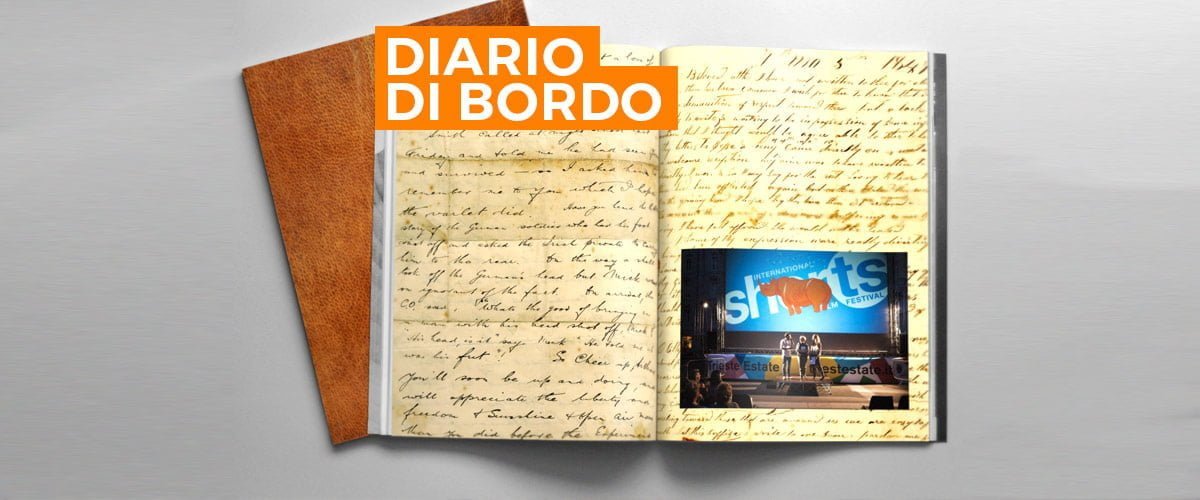Diario di bordo – Day 01
Friday 01 luglio – Day 01
You know those giant, multi-coloured jellyfish (of the non-stinging variety) that suddenly appear beside you; a silent, underwater presence?
The International ShorTS Film Festival possesses the same bewitching allure, and it ensnares you with its rich catalogue of visions and events.
It’s the press conference at Punto Enel, Monday 20th June 2016, and we are already in the fair climax of an event which never fails to surprise.
The outcome of Friday afternoon, with its Shorts 4 Sweets workshop led by filmmaker Francesco Filippi, was more than satisfying, with it allowing its young audience of 12 to 15 years to become an integral and active part of the Cinematographic World.
We will talk more at length about this in the coming days.
The inaugural evening in Piazza Verdi, on Friday, attracted a public resistant to the oppressive grip of the weather: in other words, it was very hot.
We have perhaps never given it much thought before, but the work of those we have come to call “humourists” is important, precious, and has a sort of added value that is well and truly established by Daniel Jewel in his work The Secret World of Foley.
The film also simultaneously provides an insight oozing with poetic beauty into the world of fisherman.
Pablo Vara’s short Cuenta con nosotros is a totally different proposition, in which he manages to poke fun at no lesser body than ISIS; a subject that may not appear to be particularly ripe for comedy, but which is exquisitely executed.
Much appreciated by the public were the wry, heady images of Margot Reumont’s Grouillons-nous: the small red world of a friendly bunch of fruit which, genuinely, read Marie Fraise, a version which is to them… befitting of the Marie Claire fashion magazine.
It seems as if those who wrote the work we’re going to talk about next are amongst the best in show. Certainly there was a need to have a good natured (or maybe not quite so good natured) crack at the fabric of the online jungle, where we know each other without knowing each other, and where surprises, even the most uproarious ones, wait to ambush us like a thief in the dark.
All of this is successfully achieved by Daniel Clements in Edit > Undo, which was greatly applauded.
Britain called next with Daisy Jacob’s The Bigger Picture, which talks about a job which is always delicately balanced between the cruel and the emotive through the representation of both senility and the meanness of certain behaviours.
There is a persistent sense of death and sulphur in this work, but there is also an excellent study of story-telling methods.
At last Italy comes to the screen thanks to Matteo Petrelli’s Punto di vista which, behind the chinking of glasses at a bar, hides a warning that diversity should be considered from all possible perspectives.
Simon Tillaas’ Den lille døden, however, is a whole other kettle of fish. It lifts the lid of a huge pot heavy with human relationships which push the limits of consent, with an absolutely extraordinary young protagonist completely at the mercy of the mechanisms of the adult world.
The general tone of the discussion was mellowed slightly by the following film: Juan Beiro’s Vainilla. Who can say what and how great an impact chatting, even casually, can have on the lives of each of us?
It is a work whose contents lead us to a wise final conclusion.
Extraordinary from a visual and staging perspective was Natalie Plaskura’s Faint.
We are faced with a work whose images conserve the cold poeticism of several stories from the North, by here everything fluctuates or, more accurately, the characters transform themselves before returning to their original forms. This is pure poetry.
Much has been written and seen about the military, and so props must go Roberto Collío who, through his Muerte blanca, recounts and incident of conflict and soldiers which unfolds under a silent cover of black and white.
The destiny of the protagonists is like short crust pastry between the great hands of Destiny.
We reach the home straight with Kevin Newbury’s American short Stag, in which the past once again knocks at our door and we can do no less than open it.
Ewa Gorzna’s Rearranged doesn’t need physical protagonists for its truly elegant exposition: the ambience and objects change, drift away and transmute themselves in a hypnotic lullaby with surreal connotations.
Midnight passes and still the heat hasn’t subsided, but we have hardly scratched the surface of our long cinematic journey, which will continue on Saturday night.
Riccardo Visintin




Leave a Reply
Want to join the discussion?Feel free to contribute!